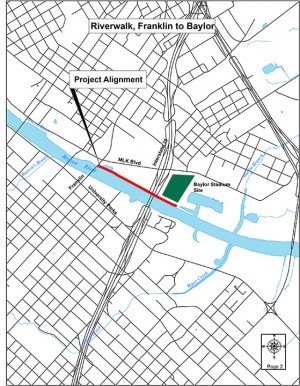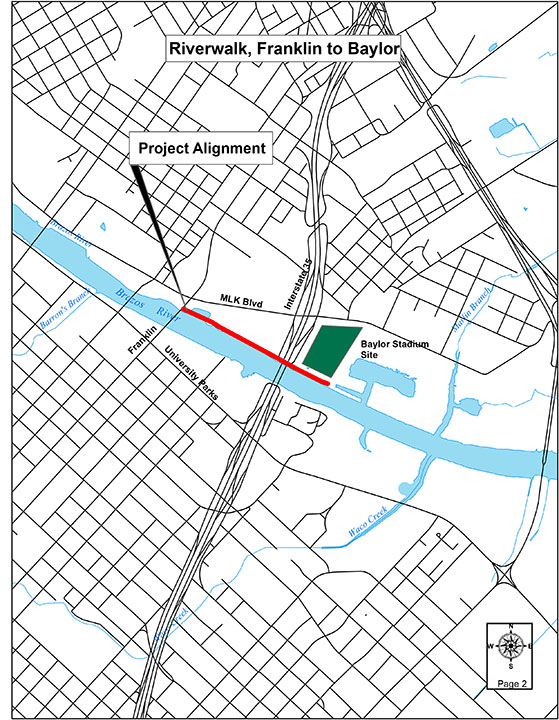
Staff Writer
It will be easier for pedestrians to get around Waco as Waco city officials begin plans to extend the Brazos Riverwalk.
The city of Waco has recently received money from the federally funded program called the Transportation Enhancement Program, said a staff member of the Texas Department of Transportation who did not wish to be identified. Money is given under the Transportation Enhancement Program to support local projects that have a strong link to transportation.
“It was created to provide funds for projects that do a little above and beyond what the department’s used to doing,” the staff member said.
Waco was selected in July by the Texas Department of Transportation to receive $2.7 million of a $3.3 million project to extend the Brazos Riverwalk area, the staff member said.
“Projects should go above and beyond standard transportation activities and be integrated into the surrounding environment in a sensitive and creative manner that contributes to the livelihood of the communities, promotes the quality of our environment and enhances the aesthetics of our roadways,” the Texas Department of Transportation’s website states about the Transportation Enhancement Program.
Trails running through Waco are currently well-connected, but they don’t go as far as they need to, said Chris Evilia, director of the Waco Metropolitan Planning Organization. They are expensive to create, so the city of Waco can only construct one section at a time, he said. Evilia said he anticipates having a good network of paths. The trail that is under development currently stops by Martin Luther King Jr. Park and Franklin Avenue, and will be extended to the new Baylor Stadium. The exact path that this trail will take, however, is yet to be determined, Evilia said.
“We’ve been working on various segments of the riverwalk really over the last 20 years, and we’ve been funding it piecemeal one at a time, and this was kind of the next logical extension of that river walk,” Evilia said. “And right now we’re about, from what I understand, getting close to construction on the segment that would go from Herring Avenue to Brazos Park East, which is across the river from Cameron Park.”
There are wetlands along the river corridor that the city will have to take into consideration when building the new trail, Evilia said. He said he anticipates that the trail will have to be elevated in this area, and that there will be an inability to fill in the wetlands.
“The U.S. (Army) Corps of Engineers steps in at that point, and there are very strict regulations about the filling in of wetlands or the filling of any kind of waterways at all,” Evilia said. “And so it would not surprise me if a substantial portion of this trail is elevated, or basically a bridge – which is probably why this is a very expensive project.”
Evilia said he projects that it will take a year to draw engineering plans for the new trail. Based on how long it’s taken to construct other sections, he said it could then take a year to 18 months to construct.
Other segments of already existing trails, such as a section spanning from Herring Avenue to Martin Luther King Jr. Park and one section going through Baylor campus, are examples of trails previously funded through the Transportation Enhancement Program, Evilia said. The trail that is now to be developed was the next logical step, he said.
“Eventually, once the entire system is complete, basically it provides a multipurpose connection, really, on both sides of the river from LaSalle, all the way through Cameron Park and really ultimately all the way to the Lake Waco Dam,” Evilia said. “So if someone wanted to, you wouldn’t necessarily need to have automobiles to get to all the sites along those trails; everywhere from Baylor University, through downtown, through Cameron Park, out towards McLennan Community College and even up to the Lake Waco Dam.”
Baylor is building a connection from campus to the stadium that will include a bridge across the Brazos River, Evilia said. This path will connect with the Brazos Riverwalk.
“On the campus side, the trail already exists,” Evilia said. “On the stadium side, they’re just going to build the portion that’s adjacent to the stadium.”
Evilia said the Brazos Riverwalk is not a part of the Brazos Riverfront project. As the Lariat previously reported, the Brazos Riverfront project is a development plan for the “use of public space, residential space, retail and restaurants” along the Brazos riverfront area, and is funded separately from the Brazos Riverwalk Project.
“I think the timing is all related,” Evilia said. “I don’t think the city would’ve asked for bids if we didn’t have the stadium going up and the river walk also taking place, so it’s all related, but they are physically separate projects, and they’re being funded through separate mechanisms.”






